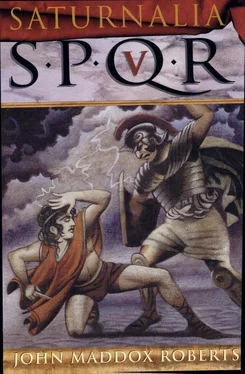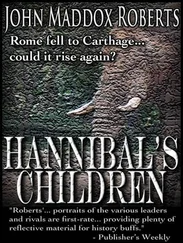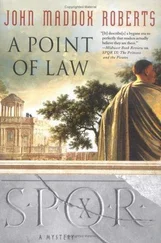John Roberts - Saturnalia
Здесь есть возможность читать онлайн «John Roberts - Saturnalia» весь текст электронной книги совершенно бесплатно (целиком полную версию без сокращений). В некоторых случаях можно слушать аудио, скачать через торрент в формате fb2 и присутствует краткое содержание. Год выпуска: 0101, ISBN: 0101, Издательство: St. Martin, Жанр: Исторический детектив, на английском языке. Описание произведения, (предисловие) а так же отзывы посетителей доступны на портале библиотеки ЛибКат.
- Название:Saturnalia
- Автор:
- Издательство:St. Martin
- Жанр:
- Год:0101
- ISBN:9780312320188
- Рейтинг книги:4 / 5. Голосов: 1
-
Избранное:Добавить в избранное
- Отзывы:
-
Ваша оценка:
- 80
- 1
- 2
- 3
- 4
- 5
Saturnalia: краткое содержание, описание и аннотация
Предлагаем к чтению аннотацию, описание, краткое содержание или предисловие (зависит от того, что написал сам автор книги «Saturnalia»). Если вы не нашли необходимую информацию о книге — напишите в комментариях, мы постараемся отыскать её.
Saturnalia — читать онлайн бесплатно полную книгу (весь текст) целиком
Ниже представлен текст книги, разбитый по страницам. Система сохранения места последней прочитанной страницы, позволяет с удобством читать онлайн бесплатно книгу «Saturnalia», без необходимости каждый раз заново искать на чём Вы остановились. Поставьте закладку, и сможете в любой момент перейти на страницу, на которой закончили чтение.
Интервал:
Закладка:
Fed and dressed, Hermes in tow, I went to a corner barber to be shaved and have my hair trimmed. It had grown a little shaggy around the ears during my voyage and long ride. Besides being necessary, there was no better place to hear the gossip of the streets.
“Welcome back to Rome, Senator,” said the barber, one Bassus, who was shaving the head of a burly butcher. The other men waiting their turn welcomed me back effusively. I was popular in my neighborhood, and in those days even patrician senators were expected to mix with the citizenry, especially in the mornings.
“It’s good to breathe Roman air again,” I said, taking an ostentatious breath through my nostrils. It smelled foul, as it usually did in Rome. “Is the district still Milo’s?”
“Solidly,” said the butcher, running a hand over his newly smooth scalp. It gleamed with oil. “Next year will be rough, but the year after’s ours.” The others agreed heartily.
“How is that?” I asked.
“Because Milo’s standing for the tribuneship next year,” said Bassus.
“Milo a tribune!” I said.
“He swears if Clodius can hold the office, so can he,” chuckled a fat banker. The gold ring of an equites winked from his hand. “And why not? If that little ex-patrician rat can be elected tribune, why not an honest, upstanding rogue like Milo?”
Milo and Clodius ran the two most powerful gangs in Rome at the time. But Clodius was from an ancient, noble family that, like mine, regarded the higher offices as theirs by birthright. Milo was a nobody from nowhere. He had been elected quaestor and was now a senator, which was difficult enough to picture. But tribune? I would have to call on him.
Actually, I had a number of calls to make. If I was going to conduct an investigation, I would have to learn how much support and help I had available to me in the City. Men of importance spent much of their time away from Rome. I also needed to learn how my enemies were disposed.
“How is Clodius behaving these days?” I asked, taking my seat on the barber’s stool.
“Almost respectably, for him,” said the banker. “He’s so happy with the prospect of taking up his office in a few weeks that he just preens and struts around, and his men don’t fight with Milo’s unless they happen to bump into one another in an alley. Both of next year’s consuls are his sympathizers, too. I hear Cicero’s already packing.”
“Who are the consuls?” I asked. “Someone told me in a letter, but I’ve forgotten.”
“Easy ones to forget,” Bassus said. “Calpurnius Piso and Aulus Gabinius. Clodius promised them fat provinces after their year in office. They’ll do as he wants.” Next year was sounding more and more like a good one to be away from Rome.
“Clodius isn’t going to have a tribuneship,” I said. “It sounds something more like a reign.”
“We got Ninnius Quadratus in as tribune,” the butcher said. “He hates Clodius. Terentius Culleo won as well, and he’s supposed to be a friend of Cicero. But they won’t be able to do much. Clodius’s gang rules the streets in most districts and they have the Via Sacra, and that means the Forum.” Everyone agreed that this gave Clodius an unfair and nearly unbeatable advantage.
If this all seems confusing, it is because Rome had two sorts of politics in those days. The great men like Caesar and Pompey and Crassus wanted to rule the whole world, and this meant they had to spend much of their time away from Rome. But Rome was where the elections were held that determined everyone’s status and future. Many communities had Roman citizenship; but if they wanted to take part in the elections, they had to journey all the way to Rome in order to vote. Thus, voting power remained a virtual monopoly of the City populace.
Hence, men like Clodius and Milo. These contended for control of the City alone. Each of the great men needed representatives to influence the elections, by force if need be, and watch out for their interests while they were away. The politics of the gangs and the City districts each controlled were as complicated as those of the Senate and the Empire. The gangs of Clodius and Milo were by no means the only ones, merely the most powerful and numerous. There were dozens of others, and these operated within a complex web of shifting alliances.
All of this was greatly aided by the fact that Rome was not so much a single city, like Athens, as it was a cluster of villages within a single continuous wall. In very remote times, it really had been seven separate villages atop seven distinct hills. As the villages gained population, they grew down the sides of the hills until they merged. The Forum back then was their common pasture and marketplace. This is why the ancient and revered hut of Romulus is not near the Forum, nor even on the Capitol, as one would think. Rather it stands amid several other sacred sites at the foot of the Palatine near the cattle market. That is probably all there was to Rome when he founded it.
The result is that Romans identify themselves as much with their districts, or ancestral villages, as they do with the City. Only outside of Rome do they really think of themselves as Romans. My neighbors were Suburans, who took pride in their famously noisy, raucous district where, they contended, all the toughest Romans were bred. They looked down upon the Via Sacrans, who thought they were holier than anyone else because they dwelled along the old triumphal route. The two districts had a famous traditional street fight at the ritual of the October Horse. And they were only two districts among many.
These things, plus the fact that Rome had no police, made gang control of the streets possible, and I would have had it no other way. It is all gone now. The First Citizen gives us peace, security, and stability; and most people these days seem happy to have them at long last. But in accepting them, we gave up most of what made us Romans.
It didn’t occur to me at the time. I was concerned mainly with getting through the next few weeks alive and trying to decide where to wait out the next year. I loved Alexandria, but people there wanted to kill me. Gaul was to be avoided at all costs. It was full of Gauls, and now there would be Germans and Caesar fighting them. There was fighting in Macedonia as well. I had spent too much time in Spain and was bored with the place. There were always the family’s rural estates, but I detested farming as much as I did the military life. Perhaps I could get posted with Cicero’s brother in Syria. It sounded like an interesting place, if the Parthians would just keep quiet. It would bear thinking about.
I rubbed my smooth-shaven jaw, detecting the usual stubble along the jagged scar left by an Iberian spear years before. It has defeated the efforts of barbers ever since.
“Hermes,” I said, “I have an errand for you.”
He looked around uneasily. “You don’t intend to go wandering around alone, do you? Here in the Subura’s fine, but nowhere else. Get Milo to lend you some of his gladiators as a guard.”
“I’m touched by your concern, but if my neighbors are right I should be safe enough in daylight. Clodius is being a jovial man of the people again. I want you to run to the house of Lucius Caesar and find out if the Lady Julia Minor is home. Her last letter was from Cyprus months ago. If she’s here, I want to call on her.”
Hermes set off at the slow amble that was his usual pace except when heading for a dice game, a gladiator fight, the races, or a meeting with some unlucky family’s pretty young housemaid.
Julia was Julius Caesar’s niece and my betrothed. Since all marriages among the great families were political, they were waiting for the political atmosphere to be correct before setting a date for the wedding. It was pure accident and a matter of no concern to my family or hers that she was the one lady I truly wanted to marry. The Metelli wanted a link with the Julii and we were to provide it. I am not sure whether these arranged marriages did any good or not. Creticus had married his daughter off to the younger Marcus Crassus, and they were deliriously happy. Caesar’s daughter married Pompey, and they seem to have gotten on well enough until she died in childbirth. Celer married Clodia for the sake of a temporary alliance with the Claudians, and I was there to find out whether she had decided to divorce him with drastic finality.
Читать дальшеИнтервал:
Закладка:
Похожие книги на «Saturnalia»
Представляем Вашему вниманию похожие книги на «Saturnalia» списком для выбора. Мы отобрали схожую по названию и смыслу литературу в надежде предоставить читателям больше вариантов отыскать новые, интересные, ещё непрочитанные произведения.
Обсуждение, отзывы о книге «Saturnalia» и просто собственные мнения читателей. Оставьте ваши комментарии, напишите, что Вы думаете о произведении, его смысле или главных героях. Укажите что конкретно понравилось, а что нет, и почему Вы так считаете.









